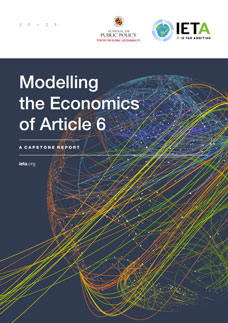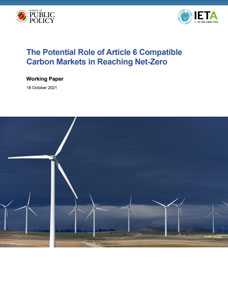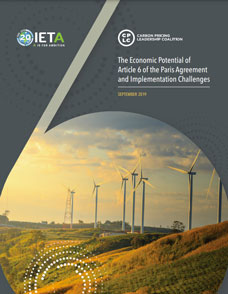Modelling the Economic Benefits of Article 6

Overview
Since 2019, IETA has partnered with researchers from the the Center for Global Sustainability (CGS) at the University of Maryland to produce a number of studies about the potential of international carbon market approaches.
This project is aimed at enhancing the effectiveness of the Paris Agreement by identifying how Article 6 implementation could encourage businesses to accelerate climate action and nations to advance more ambitious commitments
Over time, the project has received financial support from the Carbon Pricing Leadership Coalition (CPLC), Chevron, the European Bank for Reconstruction and Development (EBRD), the Government of Germany, the Government of Norway, the Government of the United Kingdom, the Institute for Global Environmental Strategies (IGES), Shell, the Swedish Energy Agency (SEA), and the World Bank.
Read more about the model used, individual studies, and how to get involved below. Do not hesitate to contact us if you would like to contribute to the further development or have questions regarding the project.
Reports
-
Findings from Modelling Runs: Voluntary Carbon Markets & NDC Implementation (2023)
Building on previous research, economic modelling was conducted to answer the question, How will VCMs interact with implementation of NDCs, with and without Article 6? The analysis demonstrated that:
- VCMs potentially have an important role to play in enabling emissions mitigation in the near term.
- Role of VCMs fade as NDCs approach net zero.
- When NDCs are implemented cooperatively using Article 6, the VCM plays a larger role transferring resources to the Global South than when NDCs are implemented independently.
-
Modelling the Economics of Article 6: A Capstone Report (2023)
Research over the past four years has increased understanding and quantified the role Article 6 of the Paris Agreement could play in facilitating the achievement of climate targets. This capstone report aims to summarise and bring new light to the opportunities available to countries participating in cooperative approaches under Article 6. The report highlights that:
- In the near-term, cooperative implementation of NDCs using Article 6 could substantially reduce the resources needed to achieve emissions reductions compared to achieving the same global outcome with all parties implementing their NDCs independently.
- If the savings from cooperative implementation of NDCs using Article 6 were reinvested in increased ambition, emissions mitigation could be more than doubled.
- Even in the case where not every country participates in cooperative mitigation, benefits always remain for those countries pursuing such cooperation.
-
Findings from Modelling Runs: The Impacts of Dropouts and Club Composition (2023)
In a recent presentation, the economic modelling analysis was expanded to consider the impact of certain countries dropping out or collaborating through separate clubs. Key messages from the analysis showed that:
- Article 6 holds enormous potential for enabling Paris ambition.
- Countries that continue to cooperate using Article 6 continue to benefit even when a large emitter does not participate. Dropping any individual country leaves the market largely intact but reduces mitigation incentives for the country that mitigates independently.
- Cooperation clubs can provide gains to participants. However, the club a country joins can affect how the country benefits from cooperative emissions mitigation.
-
The Potential Role of Article 6 Compatible Carbon Markets in Reaching Net-Zero (2021)
This report was prepared by IETA and the Center for Global Sustainability (CGS) at the University of Maryland with the aim to explore the implications of achieving net-zero targets through Article 6 cooperation, compared to alternative scenarios in which all Parties independently reduce emissions linearly to zero. The report compares carbon prices, the flow of Internationally Transferred Mitigation Outcomes (ITMOs), and associated annual financial transfers under the cooperative implementation of net-zero targets. Results finds that:
- Cooperative implementation through Article 6 compatible carbon markets allows countries to achieve net-zero targets with greater economic efficiency. The market value of financial flows between countries could exceed $1 trillion per year in 2050 and reduce mitigation costs by $21 trillion between 2020 and 2050, driven by a sharp rise in global carbon prices over time.
- Analysis shows that Article 6 compatible mechanisms could drive an increase in land use and nature-based carbon sinks, such as decreasing deforestation and increasing afforestation and reforestation. In both scenarios, countries with large endowments of land resources are more likely to become sellers.
- Article 6 cooperation can also shift capital investment from developed to developing regions where it can achieve more mitigation. This shift in financial flows can create ancillary sustainability benefits, such as improved air quality, accelerated renewable energy deployment, and new energy infrastructure.
-
The Economic Potential of Article 6 of the Paris Agreement and Implementation Challenges (2019)
This report was prepared in close partnership with the Carbon Pricing Leadership Coalition (CPLC) and investigated the potential economic and environmental outcomes associated with the use of Article 6 of the Paris Agreement by participating countries. The report, which was produced in advance of the adoption of the Article 6 rulebook at COP26 in Glasgow, outlined the following results:
- The potential benefits to cooperation in achieving the NDCs under Article 6 are large and all parties could benefit. Potential cost reductions over independent implementation of countries’ NDCs total about $250 billion per year in 2030. Cost reductions from cooperative implementation are achieved through improved economic efficiency.
- If countries are inspired to invest these cost savings in enhanced ambition, then Article 6 could facilitate additional abatement under the Paris Agreement by 50 percent or ~5 GtCO2/year in 2030.
DISCLAIMER
The findings, interpretations, and conclusions expressed in these papers are those of the authors alone and do not necessarily reflect the views of either the research sponsors or the authors’ home institutions.
THE GCAM MODEL
The main analytical tool of the project is the Global Change Analysis Model (GCAM), a highly detailed integrated model of energy, economy, agriculture, and land use, which has also been deployed to create scenarios for IPCC assessments. Its main features are:
- Can be used to test the performance of alternative emissions trading and joint implementation mechanisms;
- Can distinguish between the creation of ITMOs, potential emissions mitigation, and global changes in emissions and climate forcing;
- Can estimate the economic cost and performance of trading regimes;
- The version we use models the economy, energy, and land-use in a coupled, disaggregated system;
- Disaggregates the world into 32 geopolitical regions;
- Tracks 283 land types in its agriculture-land-use module;
- Tracks 16 different types of emissions including Kyoto GHGs, short-lived forcers, and aerosols;
- Disaggregates the energy system into primary production (from depletable and renewable resources), energy transformation (e.g. crude oil to refined products, fossil fuels or solar or wind to electricity), and end use (including, a detailed buildings sector, a detailed transport sector and a more aggregated industrial sector);
- Models agriculture and land-use as an integrated system with energy and the economy, so bioenergy demand in the energy sector directly affects food and forest production in the land-use sector;
- Has a default five-year time step.
The full documentation of GCAM is available on Github here: http://jgcri.github.io/gcam-doc/
Next initiative
View all-
CAD Trust
Learn moreTogether with the World Bank and Government of Singapore, IETA is one of the founding partners of CAD Trust, a decentralised metadata platform that links, aggregates and harmonises all major carbon credit registry data to enhance transparent accounting in line with Article 6 of the Paris Agreement.



